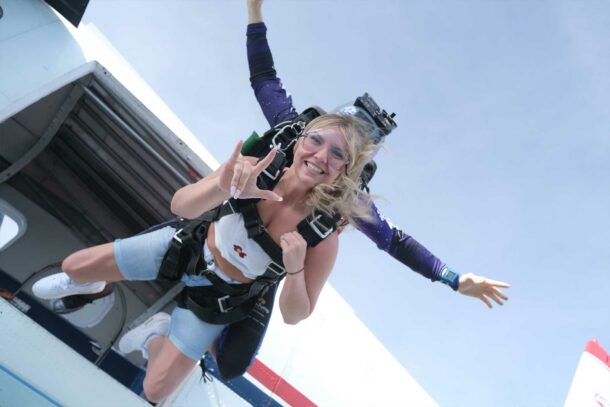Effects of Skydiving on the Brain
Wednesday, March 10, 2021
This is Your Brain on Skydiving
The brain is a fascinating organ. Seemingly a mass of gray matter and wrinkles, the brain serves as the head (pun most certainly intended) of command. As the brain filters through sensory data, it controls how we experience the world around us and how we react to it.
Certain experiences warrant more complex reactions than others. It bears to reason that a 60-second freefall from 14,000 feet might just elicit an incredible response, and indeed it does. These are the effects of skydiving on the brain.

Introducing Neurons and Neurotransmitters
Metaphorically akin to the mythological Hermes, neurons are the great messengers of the body and are responsible for the back and forth communication between the body and the central nervous system.
Astoundingly enough, from cognition and memories to necessary biological functions and just about everything in between, nearly every aspect of “living” is tied up in a complex network of neurons. At any given moment, your synapses are glistening with pulses and flashes as neurons communicate amongst themselves and the central nervous system with electrical and chemical signals. These “signals,” which are used to convey different messages between neurons, are called neurotransmitters.
To simplify, think of the neurons like your neighborhood mail person traveling far and wide delivering mail. Well, neurotransmitters are similar to the messages contained in the different pieces of mail that they deliver.
Neurons and Neurotransmitters During Skydiving
When you are faced with an extreme scenario or a perceived danger, the brain and body enter a state called “fight or flight.” When this reactionary mechanism is activated, a group of neurotransmitters called catecholamines are produced. The two catecholamines you are likely to be most familiar with are adrenaline and dopamine.
The first several times that you skydive, as you are flooded with a surge of this chemical cocktail in your brain and bloodstream, your body will experience the same sensations that are associated with the fight or flight response: increased heart rate, dilated pupils, improved mental clarity and focus, and even feelings of excitement.
Effects of Skydiving On The Brain: Dopamine Surge
The most prominent effect of skydiving on the brain is the release of the neurotransmitter dopamine. Dopamine is most closely tied to feelings of pleasure and the brain’s reward system. After a skydive, the flood of this ‘feel good’ neurotransmitter can produce even feelings of euphoria. Even though you’ll have returned to the sturdy ground, you’ll literally feel like you are on cloud nine!
In addition to the positive effect on your mood, dopamine has a positive effect on memory, alertness, the ability to focus, and uncannily enough, getting a good night’s rest. Dopamine is definitely a positive side effect of skydiving.

Effects of Fear
At its root, fear is a relatively primal emotion. For our early ancestors, fear was a reliable emotional response that kept them alert and prevented them from facing unnecessary danger—which could end their lives and, subsequently, their chance at passing on genetic traits. While the causes of fear have changed dramatically since then, the chemical processes of fear are nearly the same today as they were millions of years ago.
During times of high stress or fear, the body ramps up the production of stress hormones. These hormones prime the body to react to the perceived threat. Physically these chemical changes manifest as sweaty palms, increased heart rate, and rapid breathing. Interestingly enough, the main neurotransmitters that are produced in states of emotional arousals, such as excitement, are also produced in high quantities when you feel afraid. However, as we are sure you are well aware, unlike excitement, the feeling of fear is not perceived as pleasurable.
Is Skydiving Exciting or Fear Inducing? You Choose
In the modern-day, top psychiatrists posit that fear is influenced heavily by context. You label different experiences based on your perception of the actual danger involved.
Your skydive is a little like a pick your own adventure book. You get to choose how you experience the sensation. Luckily, because fear and excitement are manifested in the body the same way, with a bit of mental fortitude, you can turn the stirrings of fear into the palpable elation of excitement and take advantage of all that dopamine!
Now that you know the science behind the effects of skydiving on the brain, tap into your body’s natural super mood booster with a skydive today!
Related Article: The Psychology of Extreme Sports
Copyright © 2024, Skydive Carolina, All Rights Reserved.
DropZone Web Design & Marketing by Beyond Marketing, LLC





